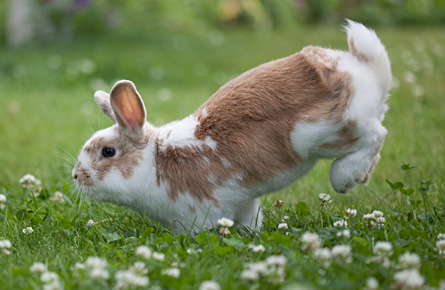Why do rabbits suffer with dental problems?
Rabbits have 28 teeth consisting of 4 maxillary incisors, 2 mandibular incisors which are considerably longer than other teeth. They have a teeth check which is where the premolars and molars are. It has been recorded that rabbits’ teeth can grow up to 12cm in a year. Due to the fact rabbits teeth never stop growing combined with the importance of needing a high fibre diet this makes them vulnerable to dental disease.

Rabbit Dental Care: Symptoms you can look out for
Rabbits will show a number of specific symptoms which will indicate to you that your rabbit has dental disease. A change in behaviour could be an indicator, your rabbit may become more irritable and lazier due to pain and lack of nutrients as your rabbit will not be eating as normal. The size of their dropping is a big clue, small droppings could mean your rabbit is not eating as much as usual or not grazing as much which can be down to dental disease, causing oral pain. Following on from that weight loss. Weight loss is a key indicator of rabbit dental disease. If your rabbit stops eating even if it's just half a day this is the reason for concern. You need to contact Sandhole Vets immediately to get an appointment booked for a rabbit dental care check-up. You may also notice swelling around the jaw, eye discharge or hypersalivation and drooling. If you notice these symptoms in your rabbit, they could be suffering the best thing you can do is get them assessed by one of our Sandhole Vets veterinary nurses.
What can I do to reduce the risks of my rabbit getting dental disease?
There are a couple things you can do as a rabbit owner to protect them from getting dental disease. Firstly, do your diet research. Finding the perfect for your diet for your rabbit will help prevent dental disease. Some supermarket-bought rabbit food is lower in fibre and higher in carbohydrates. This balance will not only disrupt your rabbit’s digestive system but will increase the number of bacteria causing a higher build-up of plaque on your rabbit's teeth. It is essential that your rabbit has access to lots of grass and hay. The grazing on grass and hay will help to grind down their teeth preventing malocclusion (rabbits teeth meet imperfectly). Finally, we would suggest regular rabbit dental care appointments. These appointments should include teeth trimming and general dental care check-ups in which our veterinary nurses can stay on top of and maintain the health of your rabbits’ teeth.
How often should I take my rabbit for dental care checkup?
Prevention and proactive methods are the keys to stopping your rabbit from contracting dental disease. Each rabbit is different, some rabbits may need their teeth trimming monthly to ensure they grow correctly and don’t cause your rabbit any discomfort. Our veterinary nurses will work with you to discuss and form a bespoke pet plan to ensure your rabbit receives the best care at the appropriate time. For more information, please contact the team at Sandhole Vets.
Contact Sandhole Vets
For a bespoke plan for your rabbit dental care in Snodland please contact Sandhole Vets. With a team of rabbit dental care experts, we are in the best place to help advise you and give treatments to your rabbits. Our team will work around the clock to ensure they diagnose, decide on a solution, and offer aftercare advice to help bring your rabbit relief and maintain their new dental health. To book an appointment or to find out more information about rabbit dental care please contact us via the online contact form | Telephone: 01634 242502 | Email:







